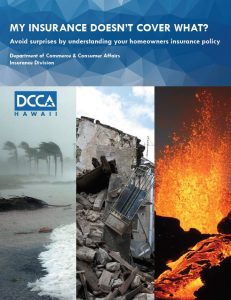DCCA: Protecting consumers, helping businesses
Posted on May 29, 2019 in Capitol Connection, Featured, MainWho can help me if I’ve been scammed? What should I do after a flood, fire or hurricane? How can I check on a business or start my own? Answers to these and dozens of other questions can be provided by the state Department of Commerce and Consumer Affairs (DCCA) — the people the community turns to for everything from consumer information and complaints to professional licensing and business registration.
DCCA’s mission covers a mind-boggling array of responsibilities — all of which affect Hawai‘i’s residents in some way. It includes the state’s insurance industries, state-licensed financial institutions, professional and vocational licensing (including real estate) and cable television. Its Division of Consumer Advocacy protects the interests of consumers before the Public Utilities Commission and other federal agencies. Its Office of Consumer Protection investigates complaints about businesses as well as launches lawsuits against companies that have harmed Hawai‘i consumers, such as in the Takata airbags case.
Overseeing it all is DCCA director Catherine “Cat” Awakuni Colón, who was recently confirmed for her second term. A graduate of Hawai‘i’s public schools, UH Mānoa and the William S. Richardson School of Law, Awakuni Colón said she learned the importance of public service and compassion through her parents. Her dad is a 30-year veteran of the Honolulu Police Department, spending roughly half of that time in its community relations division and her mom is a licensed professional cosmetologist. She has also lived and worked on Maui, which she said helps her understand neighbor island accessibility and cost issues.
“Basically, we’re here to protect consumers but also to help businesses thrive through fair, honest practices,” said Awakuni Colón. “Governor Ige very much values the work we do because our team members touch so many people who need our help. That’s why we’re working hard to improve the department’s online presence and update technology, such as increasing public WiFi hot spots, to make it easier for people to access information.” DCCA also participates in 100 to 200 events each year, sponsors financial literacy and consumer fairs, and offers numerous resources to create more savvy citizens. Here’s some timely advice from DCCA:
- BusinessCheck: Before you sign, go online – The department has launched a new website, businesscheck.hawaii.gov, designed as a “one-stop shop” for consumers to check out businesses or licensed professionals operating in the state. The website includes licensee status, complaint history, tax and business registration and other information. “Doing a search on BusinessCheck may help with decision-making before giving your money away,” said Awakuni Colón.
- “My Insurance Doesn’t Cover What?” – Awakuni Colón emphasized the importance of people checking and updating their insurance policies now, at the start of the hurricane season, instead of waiting until disaster strikes. “Know where your policy is and with which company. The typical home insurance policy doesn’t cover flooding. You should also check about coverage for relocation in case you have to live someplace else for several months.” DCCA provides easy-to-read guides about the insurance claims process including the “My Insurance Doesn’t Cover What?” booklet at https://cca.hawaii.gov/ins/tips-for-storm-claims/.
- After disaster strikes, DCCA can help – Last year DCCA staff from the insurance, financial institutions, regulated industries complaints, and business registration divisions jumped in to help people devastated by the Kīlauea eruption on Hawai‘i island and flooding on Kaua‘i and East Honolulu. “We flew people over to the Kea‘au Disaster Recovery Center for complete coverage through multiple shifts after the lava eruption,” said William Nhieu, DCCA communications officer. “We also had teams on site after the Kaua‘i and O‘ahu floods and storm because people had a lot of questions about their insurance.”

Spectrum president Gregg Fujimoto, Sen. Kalani English, Rep. Lynn DeCoite and director Awakuni Colón celebrate 100 new public Wi-Fi hot spots, including in Kalaupapa.
- Scams, fraud and security breaches – Awakuni Colón emphasized that consumers need to protect themselves against criminals who use technology to defraud their victims. “A gas pump isn’t a great place to use a debit card because people can use that information to raid your bank account,” she said. “Also, don’t answer a robocall number you don’t recognize or fall for ‘affinity scams’ where the caller says, ‘Some of our friends are going to hui up so we can make money together.’” DCCA also warns the public to be wary of “pretend” contractors. “The public can use https://businesscheck.hawaii.gov to see if a person is licensed,” said Awakuni Colón. “If you’re scammed, you can file a complaint so we can try to recover money stolen from customers.”
For more DCCA consumer resources, go to https://cca.hawaii.gov/education/. To contact someone at DCCA, call 587-DCCA, email [email protected] or go the website at www.cca.hawaii.gov. A 24-hour automated information line called ConsumerDial has answers to common questions, including landlord-tenant, financial and consumer issues and insurance information. For numbers for each island, go to https://cca.hawaii.gov/consumer-dial-information/.

